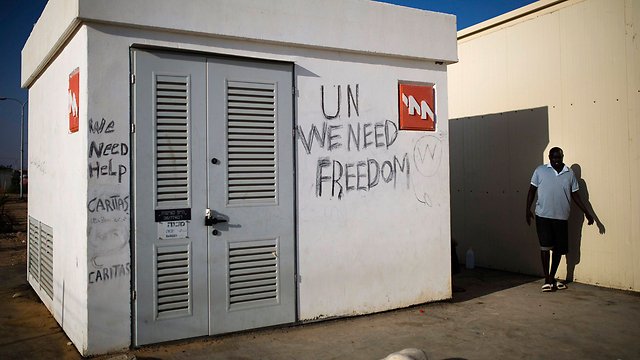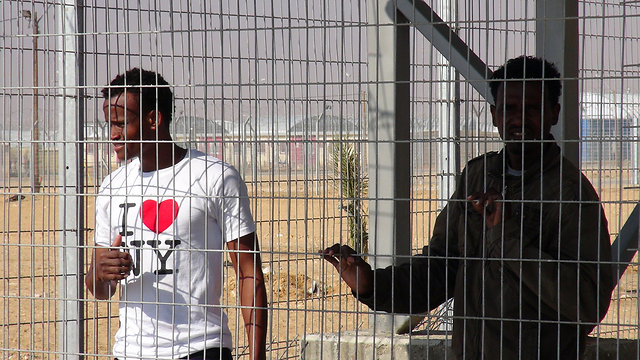
Report finds shortcomings in conditions of African asylum seekers
Human rights organization says dietary needs of detainees at the Holot facility are not met, and that the state takes too long to respond to asylum requests, leaving detainees with no time to appeal rejection.
A human rights organization said in a report released Wednesday that it has found serious shortcomings in the conditions at the Holot detention center, where 1,600 African asylum seekers are held without trial.
The report quotes testimonies from dozens of Eritreans held in Holot, whose requests for asylum have been rejected. In accordance with the strict new policy of the Population and Immigration Authority, they are facing imprisonment for an undetermined period of time at the Saharonim prison over their refusal to leave to a third country.
Out of 43 asylum seekers held in Holot who filed asylum requests, 19 were rejected after being summoned to the Population and Immigration Authority and presented with the choice of leaving Israel to Rwanda or being imprisoned in Saharonim, while 24 others were rejected before even being summoned.
Twenty of those 24 said they escaped Eritrea after serving in the Eritrean military under slavery conditions for a decade on average, with some serving for 20 years or more. Half of them were imprisoned in Eritrea and describe torture and lengthy imprisonment periods in underground cells.
These testimonies, however, do not match those appearing in international reports, including a report by the Commission of Inquiry on Human Rights in Eritrea that was released in June 2015.
The human rights organization's report brings the testimony of B.T., who served in the Eritrean army for 11 years before fleeing the country. "It's underground. There's no light, you have no change of clothes, they only take you out at night," he said.
A., another asylum seeker from Eritrea, said: "I served in the army for nine years and left because there is no end to the military service. There's no democracy and you can't talk... I was arrested because I was told I was planning to escape to Sudan... a lot of people are in prison (in Eritrea), even ministers. There's no court... if I go back, they'll arrest me, put in prison and I don't know where they will send me. All of the people in prison there, no one knows where they are... there is no law there. If I return there I'm looking at prison or death."
The report's authors said despite expressing this fear of death upon returning to Eritrea and despite their testimonies of the difficult situation in their home country, the asylum seekers are faced with Israel's uniform rejection of all requests, according to which "absenteeism from military service or defection are not sufficient in order to prove persecution according to the Human Rights Convention."
The report's authors dispute this response, saying the United Nation High Commission for Refugees recognizes Eritreans fleeing military service as refugees.
According to the report, 1,213 of the detainees in Holot (more than half) were imprisoned in the Soharsanim prison for 1-3 months by Population and Immigration Authority officials who are not judges. This was done in accordance with the law allowing imprisoning asylum seekers who violated the terms of detention in Holot.
The report also pointed to a series of issues that have yet to be fixed in Holot, some 19 months after the facility was opened.
While there has been a significant improvement in health services to detainees, the report said the bulk of their nutrition is empty calories in the form of bread and white rice; celiac and diabetes patients are not receiving suitable food; and the little pocket money the detainees receive from the state is not enough to buy food outside the facility on a regular basis. In addition, the report claimed that during searches of the detainees' rooms, personal items like small heaters are confiscated.
The report quotes asylum seekers who say the pocket money they receive (NIS 160 for ten days) is not sufficient to meet their basic needs. Most of them spend their money on food they buy outside the facility, public transport, and the purchase of soap, shampoo and cigarettes - this despite claims from the authorities to the Supreme Court that the asylum seekers are provided with basic hygienic necessities.
The report also notes the state submits the rejection of asylum requests two months late and sometimes even later, saying the delay leaves asylum seekers no times to appeal the decision.
The Interior Ministry has yet to respond to the report.
The Israel Prisons Service stressed the report "was done in a one-sided manner. Even though it points to improvement in imprisonment conditions, it also includes some unsubstantiated facts. Forbidden items are confiscated in accordance with the detention center's rules and the confiscated items are kept for the detainees. The food at the center is based on dietary plans made by dieticians and professionals, the same as in other Prisons Services facilities. We serve food suitable to the needs of sick detainees (over 40 people today) based on the instructions of the doctors at the facility. Bringing food into the facility is forbidden for security, health and safety reasons. All of their nutritional needs are provided by us."













